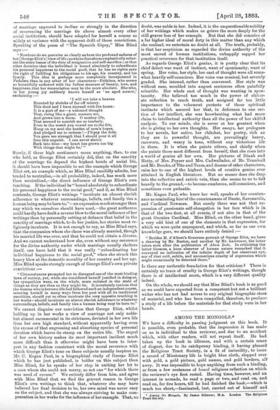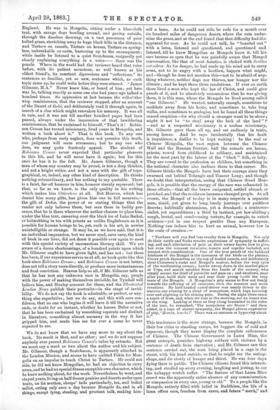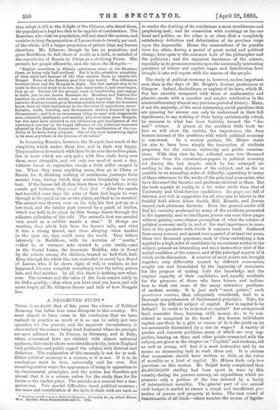AMONG THE MONGOLS.*
WE have a difficulty in passing judgment on this book. It is possible, even probable, that the impression it has made- on us is individual to this reviewer, and due to an accident which, with other readers, will not repeat itself. He had taken up the book in idleness, and with a certain sense- of disgust, due to its catchpenny binding, it having pleased the Religious Tract Society, in a fit of imbecility, to issue a record of Missionary life in bright blue cloth, slopped over with gold, a gold picture, gold names, and gold borders, all awry. It was impossible to hope anything from such a binding, or from a few sentences of banal religious reflection on which, the reviewer's eye first rested. Having time, however, and an interest in nomads, he read a page or two, and read om an& read on, for five hours, till he had finished the book,—which is much too short,—fascinated, lost, carried out of himself and Among the Mongols. By James Gilmour, M.A. London The Religious Tract hoe.ety. .
England. He was in Mongolia, sitting under a blue-cloth tent, with savage dogs howling around, and gazing outside, through the. doorless doorway, on a vast panorama of poor tufted grass, stretching away to huge black hills in the distance, and Tartars on camels, Tartars on horses, Tartars on spring- less, unbreakable ox-carts, hastening up to the encampment; while inside he listened to a quiet Scotchman, resignedly yet clearly explaining everything in a voice— there was the puzzle. Where in the world had the reviewer heard that voice before, with its patient monotone, as well known as his oldest friend's, its constant digressions and "reflections," its sentences so familiar, yet so new, sentences which, as each topic came up, he could write before they were uttered. "James Gilmour, M.A." Never knew him, or heard of him; yet here was he, talking exactly as some one else had years ago talked a hundred times. So oppressive at last became the will-o'-the- wisp reminiscence, that the reviewer stopped, after an account of the Desert of Gobi, and deliberately read it through again, in search of a clue which might reawaken his memory. It was all in vain, and it was not till another hundred pages had been passed, always under the impression of that bewildering reminiscence, that he exclaimed to himself," That's it ! Robin- son Crusoe has turned missionary, lived years in Mongolia, and written a book about it." That is this book. To any one who, perhaps from early neglect, does not perceive this truth, our judgment will seem erroneous ; but to any one who
does, we may quite fearlessly appeal. The student of Robinson Crusoe never expected. that particular pleasure in this life, and he will never have it again ; but for this once he has it to the full. Mr. James Gilmour, though a man of whom any country may be proud, is not a deep thinker, and not a bright writer, and not a man with the gift of topo- graphical, or, indeed, any other kind of description. He thinks nothing extraordinary, and has nothing to say quotable. There is a faint, far-off humour in him, humour sternly repressed; but that, so far as we know, is the only quality in his writing which makes him /ittgrateur at all. But Heaven, which has denied him many gifts, has given him one in full measure,— the gift of Defoe, the power of so stating things that the reader not only believes them, but sees them in bodily pre- sence, that he is there wherever the author chooses to place him,
under the blue tent, careering over the black ice of Lake Baikal, or hobnobbing in tea with priests as unlike Englishmen as it is possible for human beings to be, yet, such is his art, in nowise unintelligible or strange. It may be, as we have said, that it is an individual impression, but we never read, save once, the kind of book in our lives, did not deem it possible ever again to meet with this special variety of unconscious literary skill. We are aware of a dozen shortcomings, of a hundred points upon which Mr. Gilmour ought to have given light, and has not ; but there
has been, if our experience serves us at all, no book quite like this book since Robinson Crusoe; and Robinson Crusoe is not better, does not tell a story more directly, or produce more instantaneous and final conviction. Heaven help us all, if Mr. Gilmour tells us that he has met any unknown race in Mongolia, say, people with the power of making themselves invisible, for Tyndall will believe him, and Huxley account for them, and the Illustrated London News publish their portraits—in the stage of invisi- bility. We do not say the book is admirable, or perfect, or any- thing else superlative; but we do say, and this with sure con- fidence, that no one who begins it will leave it till the narrative ends, or doubt for an instant, whether he knows Defoe or not, that he has been enchained by something separate and distinct in literature, something almost uncanny in the way it has gripped him, and made him see for ever a scene he never expected to see.
We do not know that we have any more to say about the book. Its merit is that, and no other ; and we do not suppose anybody ever proved Robinson Crusoe's value by extracts. But we must say a word or two about the author and his subject. Mr. Gilmour, though a Scotchman, is apparently attached to the London Mission, and seems to have quitted Pekin for Mon- golia on an impulse to teach Christ to Tartars. He could not ride, he did not know Mongolian, he had an objection to carry arms, and he had no special fitness except his own character, which he knew nothing about, for the work. Nevertheless, be went, and stayed years, living on half-frozen prairies and deserts under open tents, on fat mutton, sheeps' tails particularly, tea, and boiled
et, eating only once a day because Mongols do, and, in all things, except lying, stealing, and prurient talk, making him- self a lama. As he could not ride, he rode for a month over six hundred miles of dangerous desert, where the rats under- mine the grass, and at the end found that that difficulty had dis-
appeared for ever. As he could not talk, he "boarded out" with a lama, listened and questioned, and questioned and listened, till he knew Mongolian as Mongols know it, till his ears became so open that he was painfully aware that Mongol conversation, like that of most Asiatics, is choked with doubles- entendres. As for danger, he had made up his mind not to carry arms, not to be angry with a heathen, happen what might, and—though he does not mention this—not to be afraid of any- thing whatever, neither dogs nor thieves, nor hunger nor the climate ; and he kept those three resolutions. If ever on earth
there lived a man who kept the law of Christ, and could give proofs of it, and be absolutely unconscious that he was giving them, it is this man, whom the Mongols he lived among called "our Gilmour." He wanted, naturally enough, sometimes to meditate away from his hosts, and sometimes to take long walks, and sometimes to geologise, but he found all these things roused suspicion—for why should a stranger want to be alone ; might it not be "to steal away the luck of the land " ?
—and as a suspected missionary is a useless missionary, Mr. Gilmour gave them all up, and sat endlessly in tents, among lamas. And he says incidentally that his fault is impatience, a dislike to be kept waiting ! In the real or Chinese Mongolia, the vast region between the Chinese Wall and the Russian frontier, half the nomads are lamas,. priests, vowed from childhood to celibacy, and maintained for the most part by the labour of the " black " folk, or laity. They are vowed to the profession as children, but something im the national character also inclines them to that career. Mr.
Gilmore thinks the Mongols have lost their courage since they swarmed out behind Tchengis and Timour Leng; and though we doubt that interpretation, seeing that Chinese dread Mon- gols, it is possible that the energy of the race was exhausted in those efforts,—that all the brave emigrated, settled abroad, or
perished, and that the residuum became a changed people. At all events, the Mongol of to-day is in many respects a separate
man, timid, yet given to long, lonely journeys over pathless deserts ; habitually abstemious, yet a drunkard; a controver- sialist, yet superstitious ; a thief by instinct, yet law-abiding ; rough, brutal, and cruel—using torture, for example, to extort evidence—yet in one respect gentler than any European..
Nothing can induce him to hurt an animal, however low in the scale of creation :—
" Nowhere will you find less cruelty than in Mongolia. Not only do their cattle and flocks receive expressions of sympathy in suffer- ing, and such alleviation of pain as their owner knows how to give, but even the meanest creatures, insects and reptiles included, are treated with consideration. One of the best proofs of the habitual kindness of the Mongol is the tameness of the birds on the plateau. Crows perch themselves on the top of loaded camels, and deliberately steal Chinamen's rusks and Mongol's mutton, before the very eyes of the vociferating owners; hawks swoop down in the market-place at Urge, and snatch eatables from the hands of the unwary, who simply accuse the thief of patricide and pass on ; and swallows, year after year, build their net and rear their young inside the very tents of the Mongols. A Mongolian's pity seems to flow out freely towards the suffering of all creatures, even the meanest and most vexations. My bald-headed camel-driver was nearly driven to dis- traction one evening by a cloud of mosquitoes, which kept hovering over and alighting on his shining pate. During the night there came a touch of frost, and, when we rose in the morning, not an insectr was on the wing. Looking at them as they clung benumbed to the sides of the tent, he remarked, The mosquitoes are frozen !' and then added, in a tone of sincere sympathy, the Mongol phrase expressive of pity, 'Hoarlre, hoarhe There was no sarcasm or hypocrisy about it."
This tenderness is the more strange, because the Mongols, in their few cities or standing camps, let beggars die of cold and exposure, though they never display the complete callousness of Chinese. The Chinese Government in Lama Miao, the great entrepot, punishes highway robbery with violence by a sentence of death from starvation ; and Mr. Gilmour saw this sentence carried out, the man being placed in a cage in the street, with his head outside, so that he might see the eating. shops, and die slowly of hunger and thirst. He was four days dying there in public. The Chinese citizens found this interest- ing, and strolled up every evening, laughing and jesting, to see the unhappy wretch suffer. "The feature of that Lama Miao crowd was the apparently entire absence of any commiseration or compassion in every one, young or old." To a people like the Mongols, entirely filled with belief in Buddhism, the life of a, lama offers ease, freedom from cares, and future "merit," and
they adopt it till, to the delight of the Chinese, who dread them, the population is kept too thin to be capable of combination. The Russians, who wish for population, will not stand the system, and contrive to keep the proportion of Lamas down to twenty per cent.
of the whole, still a larger proportion of priests than any known elsewhere. Mr. Gilmour, though he has no prejudices, and gives Buddhism its full share of credit as a faith, is satisfied of the superiority of Russia to China as a civilising Power. She protects her people efficiently, and she raises the Mongols :—
"English travellers in Siberia sometimes sneer at the Russians there, as being only half-civilised. Bat it is the primitive simplicity of their style and manner of life that enables them to elevate the Mongol. Some of the Russian poor live very rudely. The difference between them and the Mongols is slight. The first upward stop to be made in the social scale is so low, that many make it, and once begun, they go on. Buriats till the ground, work at handicrafts, and engage in trade, just as the poorer Russians do. Russians and Buriats live together on good terms, eating and sleeping together. The Bariats learn the Russian tongue, go to Russian schools, know what the Russians know, have all their aspirations in the direction of agriculture, manu- factures, trade, learning, and Government service, fostered by the Government ; and it is no uncommon thing to meet with respectable men, educated, intelligent, and wealthy, who were born mere Mongols, but who have been elevated to the civilisation and intelligence of the nineteenth century by the happy influence of the judicious measures adopted by the Russian Government for the amelioration of the con- dition of its more lowly subjects. One of the most interesting sights to be seen anywhere is the process of elevation."
In becoming Russian, however, the Mongols lose much of the simplicity which makes them free, and in their way happy. They wander on horseback with their flocks over the endless plain, live in tents which are only poles with blue cloth hung over them, wear sheepskin, and eat only one meal of meat a day, without bread or vegetables, except a little millet steeped in tea. When they want anything more, they go to China or Russia for it, thinking nothing of continuous journeys three months long, during which they receive hospitality in every
tent. If the horses fall ill, they leave them to get better; if the camels get footsore, they mend their feet. "After the camels
had travelled some days the soles of their feet began to wear through to the quick in one or two places, and had to be mended!
The animal was thrown over on his side, his feet put up on a low stool, and the tender part covered by a patch of leather, which was held in its place by thin thongs drawn through the adjacent callosities of the sole. The animal's foot was mended very much as a cobbler mends a shoe." If thongs are wanting, they pluck hair from the horse's tails, and twist it into a strong thread, and thus, sleeping when needful in the open air, they could cross the world. They believe intensely in Buddhism, with its doctrine of "merits," —that is, of virtuous acts carried to your credit,—and in the Grand Lama, the incarnate Buddha, who is found by the priests among the children, treated as half-God, half- King through his whole life, but controlled in secret by a Board of Lamas, who, if he shows signs of will, or realises, as has happened, his own complete ascendancy over the tribes, poison him, and find another. In all this there is nothing new what- ever. The newness and the value of the book consist solely in its Defoe quality,—that when you have read you know, and will never forget, all Mr. Gilmour knows and tells of how Mongols live.




































 Previous page
Previous page